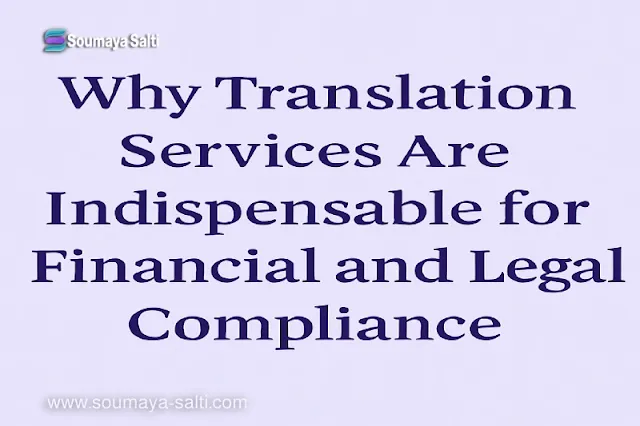 |
| The Role of Translation in Legal and Financial Compliance |
Business Documents and the Role of Translation Services in Legal and Financial Compliance
In today’s fast-paced and highly regulated global economy, multinational companies, particularly those in the banking and financial services sector, are operating across diverse legal frameworks, languages, and financial jurisdictions. This makes the accurate translation of business documents not merely a matter of convenience, but a cornerstone of legal and financial compliance.
Document translation services ensure that key financial statements, regulatory filings, corporate policies, and legal agreements remain compliant with local laws, while preserving the intent and precision of the original documents. The slightest error or ambiguity in legal or financial translation can lead to regulatory penalties, loss of investor confidence, or operational disruption.
Why Translation Services Are Indispensable for Financial and Legal Compliance
For global banks and financial institutions, ensuring that every document, from anti-money laundering (AML) policies to cross-border investment agreements, is accurately translated into the local language is a non-negotiable requirement. Regulatory bodies in many countries mandate that all legal and financial records related to local operations be submitted in the official language of the country, meaning professional translation services are essential for:
* Risk Management and Regulatory Filings
* Contractual Agreements with Multinational Stakeholders
* Internal Compliance Manuals and Code of Conduct
* Annual Reports and Financial Statements
* Legal Proceedings and Arbitration Documents
Without these translations, companies risk non-compliance fines, litigation, or suspension of operations.
5 Global Banks That Relied on Translation for Legal and Financial Compliance
1️⃣ HSBC Holdings plc
HSBC, one of the world's largest banking institutions, operates in over 60 countries and territories. The bank faced multiple regulatory reforms in countries like China, France, and the UAE, where financial regulations demand the submission of internal compliance manuals and financial reports in the official local languages. HSBC has consistently relied on certified translation services for translating anti-fraud frameworks, financial crime compliance reports, and regulatory disclosures to avoid sanctions and maintain operational licenses.2️⃣ JPMorgan Chase & Co.
As a leading American investment bank with significant international operations, JPMorgan Chase must comply with diverse regulatory systems in Europe, the Middle East, and Asia. The bank employed expert legal translation teams during the implementation of the EU’s Markets in Financial Instruments Directive II (MiFID II). This required accurate translation of trading policies, customer agreements, and transaction reporting rules into multiple European languages to meet the directive's strict compliance standards.3️⃣ BNP Paribas
BNP Paribas, one of Europe’s largest banks, relies heavily on multilingual documentation for compliance with the financial and banking regulations in regions like North Africa and the Middle East. During its strategic expansion in Morocco, the bank translated complex legal contracts, credit agreements, and corporate governance policies into Arabic and French, ensuring regulatory conformity and local stakeholder confidence.4️⃣ Citibank (Citi)
Citibank’s global presence necessitates continuous multilingual compliance communication. In 2023, Citi mandated the translation of its data privacy compliance documentation, including client consent forms and data processing agreements, for its operations in Germany, Brazil, and the UAE following data protection regulation updates (such as the UAE’s Data Protection Law No. 45 of 2021). The project involved certified legal translators with sector-specific expertise.5️⃣ Deutsche Bank AG
Deutsche Bank, operating across multiple legal jurisdictions, particularly in Asia-Pacific and the Middle East, has implemented major translation initiatives for internal legal policies, risk disclosures, and financial reports. In compliance with the Hong Kong Monetary Authority’s bilingual filing requirements, Deutsche Bank regularly translates quarterly financial statements and compliance reports into both English and Chinese to avoid penalties and ensure operational continuity.6️⃣ Standard Chartered Bank
Operating extensively across Africa, the Middle East, and Southeast Asia, Standard Chartered has translated hundreds of legal agreements, financial compliance policies, and tax documentation to comply with local banking laws in markets such as Kenya, Oman, and Malaysia. The bank engaged expert translation firms with deep knowledge of international financial law to translate and certify legal documents for submission to financial regulatory authorities.Why These Translations Matter for Bank Executives
For bank executives, access to accurate, legally compliant, and timely translations is vital for several reasons:
* Strategic Decision-Making: Executive teams must review translated compliance documents to make informed investment and operational decisions in different markets.
* Regulatory Risk Mitigation: Accurate translations protect the institution against regulatory action, financial penalties, and reputational harm.
* Seamless Cross-Border Operations: Executives rely on localized legal frameworks and translated agreements to negotiate deals, partnerships, and mergers.
* Corporate Governance: Properly translated codes of conduct and internal compliance documents ensure that all employees, regardless of location, understand their legal obligations.
Bottom Line
In an era of globalization and increased financial regulation, professional business document translation services have become indispensable to the banking sector. From ensuring legal compliance to facilitating cross-border mergers and risk management, accurate translation of legal and financial documents is a strategic imperative, one that protects institutions, preserves reputations, and empowers executives with the clarity needed to lead in a complex, multilingual world.
Translation Techniques Used in Legal and Financial Document Translation
Translating legal and financial documents demands not only linguistic accuracy but also technical precision, cultural awareness, and adherence to the legal systems of both source and target languages. Professional translators employ a combination of specialized translation techniques to navigate this complexity.
Literal translation is often favored for contractual clauses and regulatory texts to preserve the exact legal effect of the source document. Equivalence and adaptation techniques are used when translating culturally or legally specific terms, such as financial instruments or tax codes, that have no direct equivalent in the target legal system.
Additionally, modulation may be applied to adjust the point of view or phrasing without altering the legal meaning, especially in compliance manuals and corporate governance policies. To ensure consistency and mitigate legal risk, translators also rely on terminology databases, translation memories, and certified glossaries tailored to financial law and banking regulations. These methods together guarantee the legal enforceability and operational clarity of the translated documents across jurisdictions.
